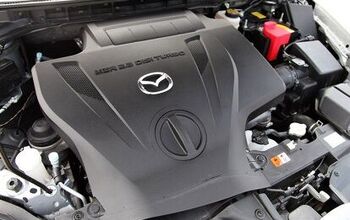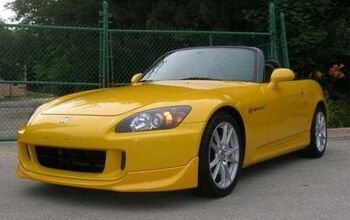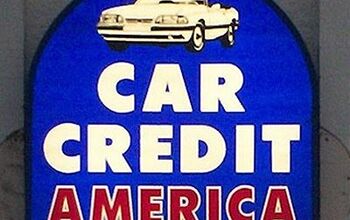Piston Slap: Reporting on The Oil Report

Greg writes:
Sajeev, first let me thank you for your interesting article on Mazda rust last year. Ultimately I bought the Accord, which to me seemed to have the superior (and quite lovely) stick shift, even though the Mazda is reputed superior in that department.
I decided for kicks and giggles to get my oil tested by Blackstone, and I thought this might be a potential article for Piston Slap (not my adventure, but the practice of having it done).
It wasn’t as complete a report as one might hope, because my mechanic forgot to draw the sample and dumped the oil in the barrel. All I could forward to Blackstone was a few drops from the oil filter. But they were able to test that small sample, except for the flashpoint and viscosity.
Here’s the report in PDF form.
Of interest:
- The metals are about 10x the average level of metals (chrome, copper, aluminum, molybdenum, etc.) in most cars. Blackstone said this is the breaking in process, but this is the first time I’ve seen real data on the “wearing in” or “breaking in” of a car.
- The TBN (total base number) was 2.1, over the 1.0 minimum suggested by Blackstone, after 8,200 miles. Apparently engine oils are made to lean to the base side and as they get used the base number declines and in the extreme case will become acidic. I did some research on this and the TBN of the OEM Honda oil was apparently about 8.1 when new (just sleuthing around to see what Honda used) and the TBN of the Mobil 1 synethetic 0-20W is about 8.8. If you get the long-lasting or extended use formula (whatever they call it) it has a TBN of about 12 when new but you’re going up to something like 5-30, which is not the recommended oil for this Accord.
For $40 I think it was a useful thing to do. It put my mind to rest about my practice of changing my oil 2x a year, and it seems like something one should do in the first year or two of ownership and again in the car’s elder years when it can diagnose various kinds of engine degradation. Apparently oil testing is a competitive industry, but the usual customer is a fleet owner who is looking at a significant operating cost in oil changes.
Sajeev concludes:
I am glad these oil report services exist as they do make folks feel more comfortable and help ensure a healthy motor. As we’ve learned from many vehicles ( here and here, for starters) over the last 15+ years, doing whatever the owner’s manual recommends isn’t necessarily the right move.
Blackstone’s recommendation to extend your oil change intervals to 9,000 miles makes sense, considering their analysis and the fact that this Honda isn’t known to be a sludge bucket.
Off to you, Best and Brightest!
[Image: Shutterstock user Africa Studio]
Send your queries to sajeev@thetruthaboutcars.com. Spare no details and ask for a speedy resolution if you’re in a hurry…but be realistic, and use your make/model specific forums instead of TTAC for more timely advice.

More by Sajeev Mehta
Latest Car Reviews
Read moreLatest Product Reviews
Read moreRecent Comments
- ToolGuy The only way this makes sense to me (still looking) is if it is tied to the realization that they have a capital issue (cash crunch) which is getting in the way of their plans.
- Jeff I do think this is a good thing. Teaching salespeople how to interact with the customer and teaching them some of the features and technical stuff of the vehicles is important.
- MKizzy If Tesla stops maintaining and expanding the Superchargers at current levels, imagine the chaos as more EV owners with high expectations visit crowded and no longer reliable Superchargers.It feels like at this point, Musk is nearly bored enough with Tesla and EVs in general to literally take his ball and going home.
- Incog99 I bought a brand new 4 on the floor 240SX coupe in 1989 in pearl green. I drove it almost 200k miles, put in a killer sound system and never wish I sold it. I graduated to an Infiniti Q45 next and that tank was amazing.
- CanadaCraig As an aside... you are so incredibly vulnerable as you're sitting there WAITING for you EV to charge. It freaks me out.


































Comments
Join the conversation
I didn't realize my note to Sajeev would constitute the substance of the article or I would have written it a bit differently. One of the reasons why I wanted to get the oil tested was that the Honda uses 0-20 weight and I was concerned that something like 5-30 or 10-30 might be a better choice. As it happens 0-20 stands up to the use I put on the car. I'm not interested in changing the oil at 9k as 2x per year (roughly 6 to 8k on average) is my usual routine, and what I wanted to do was validate my usual routine with the lighter oil. An additional reason for getting the oil tested was that I was in correspondence with a Honda Accord owner in Canada who has been having problems with gasoline getting into his oil in cold weather, and I was worried that I would have the same issue. His dipstick levels actually rise as a result of this problem. I don't know if his problem is unique or widespread but so far I haven't seen it. He has had the engine replaced. Oils designed for durability have a higher TBN than the 0-20 synthetic but it seems that the 0-20 is just fine. I'm not looking to extend the oil changes to one year and beyond because I agree that it is wise to keep tabs on the oil levels and changing the oil twice a year is affordable to me. It's also affordable to me to get the oil tested I've blown forty bucks on things that were a good deal less interesting to me.
And one more data point, one for a Panther, in honor of Sajeev, who helped to hone my Panther love. I believe my assertion about oil weight in the modular motor OHC V8's is correct. I will not give detailed references, but will name my sources. The 4.6L V8 originally came with a recommendation to use 5W-30 oil. Later FoMoCo changed that to 5W-20. But cutting to the chase, this was done mostly to placate our CAFE masters, gaining miniscule mpg savings. A certain knowledgeable member of the B&B may have knowledge of a different version of this story, but I believe I have seen some fairly convincing docs showing that, with a moderately large dollar-denominated gun pointed to its corporate head, Ford elected to roll over from the 30 to the 20 number. And I believe it is probably "good enough" to use the 5W-20, but the 5W-30 provides a bit more protection. I haven't ever seen a source that says that the new spec is good for the engine in any way other than fractional mpg. A former Ford engineer who later worked for NASCAR as an engineer stated that fact, and posted some links to support it. And he said that while most motors do not get used hard enough to create a problem, for him, the 5W-30 was a bit better from the standpoint of engine protection, and that he personally would continue to run it in his 4.6L V8. And I am doing the same...I change the oil on my Panther every 6K miles, based on the fact that there are some short hops, but I try to time the engine to at least get the motor and the oil well warmed up to prevent sludge, and the oil still looks and feels clean at 6K. While I intend to use one of the more or less all-inclusive FoMoCo services one of these times, which with discounts are around $30, my wife prefers that we save about ten bucks, and go for the $20 chain corner shop changes. Never Jiffy Lube after a dim bulb poured oil into the clutch inspection hole on the bell housing of a Rabbit, but Tires Plus (a Firestone sub), Mr. Tire, that sort of thing. And I watch them like a hawk, and mark the filter to make sure it got changed. Use a Kendall syn blend, 5 qts. With my driving patterns that works out to about two changes a year, perhaps a bit more if we take a distant vacation. My other local chain store uses Valvoline. Indications are from what I have seen on BITOG and elsewhere that both are at least solid choices. YMMV, but this seems like a good decent drill for the Panther. At least it still purrs for me when I rev it and when a put a bit of shoe to it every now and then. Runs a bit quicker too with a Superchips 87 octane tune. Would like the hotter tune, but hate to work a 200K engine too hard. Just wanted a little more acceleration and some firmer shifts, which I got. But it is a good car, and I feel I am treating it well with that interval and that grade and brand of oil. Not that I couldn't just spend another $50 a year plus or minus to change it every 3K, but I just don't see evidence that it does any measurable good.